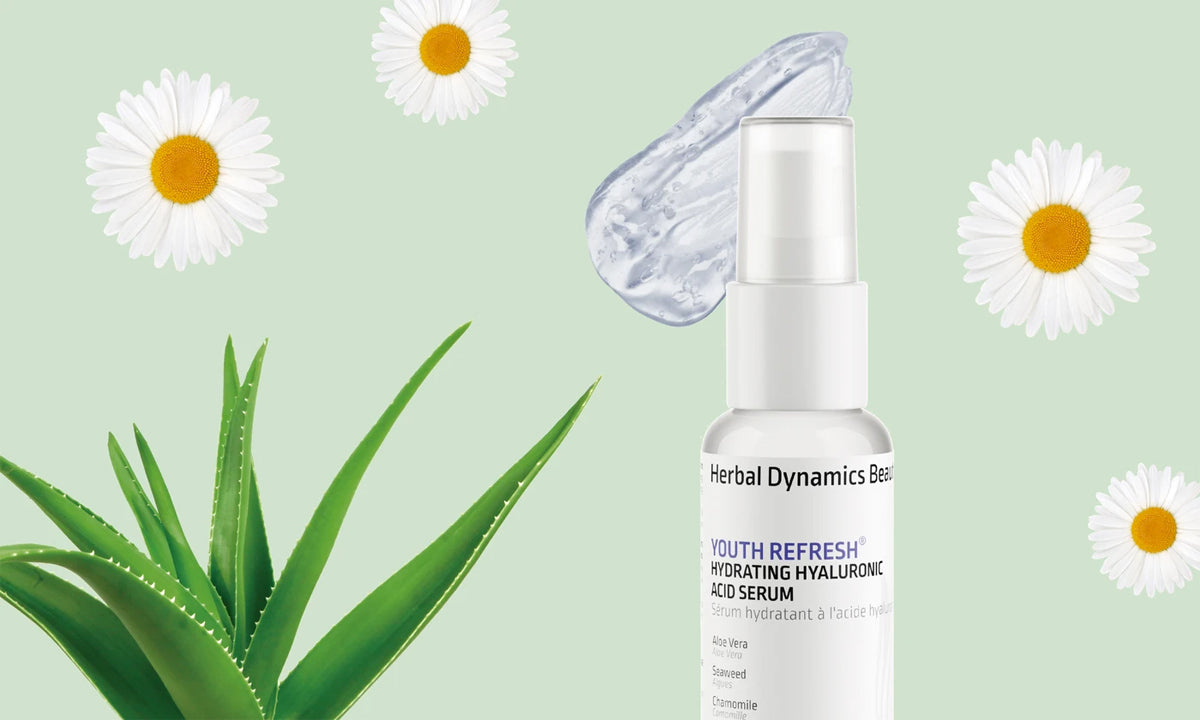Your Cart is Empty
FREE SHIPPING on US orders over $45. Save 25% With Code TAKE25 at checkout.
FREE SHIPPING on US orders over $45. Save 25% With Code TAKE25 at checkout.

Hyaluronic acid serum uses prove numerous, most notably what shines is their ability to provide a major dose of moisture to dry, aging skin.
One thing is certain—the process of aging is very hard on the skin, and it's the first area where aging becomes most visible. In many other respects, the beauty industry allows us to turn back time—advanced hair dyes can cover grays and restore hair to its former luster, cosmetic dentistry can transform smiles in the space of an afternoon, and a good piece of shapewear can disguise the effects of a large lunch in a matter of moments.
Skin, on the other hand, is a lot more difficult. As skin ages, it loses its ability to retain a proper moisture balance, resulting in a loss of plumpness and firmness.
Much like how a fully inflated balloon has no creases, fully hydrated and moisturized skin greatly decreases the visibility of wrinkles. Once the moisture in the skin begins to “deflate,” problem areas become much more obvious, wrinkles deepen, and skin tends to sag. That’s where hyaluronic acid steps in!
Hyaluronic acid occurs naturally in the body, where it serves to maintain the structure of the skin and promote elasticity - encouraging that “plumpness” that proves so important in wrinkle prevention.
It is an extremely powerful humectant, with the ability to attract and hold over 1000 times its own weight in water, helping skin stay plush. The natural concentration of hyaluronic acid in the skin starts decreasing as early as age eighteen, but preventative measures against its loss can slow the appearance of lines and wrinkles.
One of our greatest enemies in terms of skin damage are the dreaded free radicals - damaged, unstable molecules (often a result of sun exposure) that will attack any nearby cell in order to gain back missing electrons. If a free radical attacks an important living cell in the skin, it can cause a ripple effect - since free radicals create more free radicals - and visible signs of aging will be dramatically increased as collagen and other elements of healthy tissue are destroyed.
Thankfully, hyaluronic acid is a free radical scavenger - destroying free radicals before they have the opportunity to degrade skin cells, and keeping skin looking younger longer!
Because hyaluronic acid naturally occurs in the skin, there’s a very low chance of experiencing any sort of irritation from a hyaluronic acid serum (though you want to look out for other ingredients that can cause irritation, like added fragrances or harsh astringents/preservatives).
If your skin is lacking moisture, hyaluronic acid will pull moisture from the atmosphere into your skin - immediately restoring skin’s tautness and disguising wrinkles. To get the most out of your serum, you’ll want to apply it daily after your shower while the room is still very humid, or while your face is still slightly damp from cleansing.
Using a face scrub or gentle chemical exfoliant like a low-percentage alpha or beta hydroxy acid (the most common exfoliants are glycolic, lactic, and salicylic acids) can also help prepare the skin for your serum, as layers of dead skin could prevent ingredients from absorbing deeply. Daily sunscreen application is also a wise idea if you’re out in the sun, as UV damage can sap the skin of moisture and create more free radicals, undoing all of your skincare routine’s hard work.
For visible results, you will need to a hyaluronic acid hydrating serum once daily for at least eight weeks (though you will likely experience a boost in hydration much sooner!). Using a hydrating moisturizer after your serum soaks in will help lock in the ingredients, giving the hyaluronic acid plenty of time to absorb into your skin.
A humidifier is always great in drier climates as well, since the extra moisture provides the serum with the opportunity to pull water molecules from the environment, enhancing its effectiveness. If you apply your serum in a very dry climate, you may find that your results aren’t as dramatic.
There are hundreds, if not thousands, of serums on the market, but they’re not all created equal. Hyaluronic acid molecules are naturally quite large, making absorption into the skin difficult. The best quality serums utilize molecules of smaller sizes (the ingredient sodium hyaluronate is a good example), allowing them to sink into the deepest layers of the skin.
In addition, the best serums will also include antioxidants (another barrier against free radicals!) and even brightening ingredients like vitamin C, which can reduce hyperpigmentation. Be careful, though - artificial fragrances can irritate sensitive skin, so unscented formulas are the safest bet if you have very sensitive skin.
If you continue to use a hyaluronic serum consistently, you’ll start to see wrinkles fade, “crepiness” disappear, and the effects of sun damage diminish. A healthy, youthful glow starts with moisturized skin, and a fantastic serum is one of the keys to youthfulness. You’ll find that your hyaluronic acid serum uses and benefits are more than worth the effort!